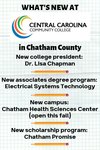

Editor’s Note: This is the first in a two-part story previewing the new school year for Central Carolina Community College. Read next week for an examination of the college’s impact on Chatham County, and vice versa.
SANFORD — At Central Carolina Community College’s first ever media day on Aug. 8, college administrators spoke glowingly of everything that was happening.
New buildings, new programs, increased student population — all things they pointed to as evidence of something great happening on CCCC’s multiple campuses.
“We’ve got the most outstanding administration, faculty staff and student body of any community college in this state system and probably in the country,” said Julian Philpott, chairman of CCCC’s board of trustees.
As the 2019-2020 school year kicks off on Aug. 19, the college’s expansion, both in size and influence, has not missed Chatham County. Here are a few things to keep an eye on and be aware of as the new school year starts for CCCC next week.
Madam President
Dr. Lisa Chapman took over as CCCC’s new president on April 1, so she’s not exactly new to the job.
She began working at the college in August 1987 as a professor, then later became the college’s chief academic officer. She left to work for the North Carolina Community College System in the same role in 2014, but the CCCC presidency opened with the retirement of T. Eston Marchant.
Chapman decided to come home. She said at the media day that she saw herself, among other roles, as a “cheerleader” for CCCC.
“We are a phenomenal college,” Chapman said. “It’s easy to cheer for a team you know is making a huge different and doing a great job.”
The decision, according to Philpott, was almost a no-brainer. He said someone asked him whether Chapman being the college’s first female president played a role.
“We know that we hired the best possible person we could hire,” he said. “I’m proud to see women have an equal opportunity. The fact is, it’s our job as trustees to hire the most qualified person we can hire. We did that with Dr. Lisa Chapman.”
Mark Hall, the provost of CCCC’s Chatham campus, said Chapman has brought an “energy” to the role that will serve her well as she oversees the college’s operations.
“She’s really thinking about how to help the students in our communities achieve the education or training that will allow them to do the work they want to do and start making their way up,” Hall said. “That’s the sort of vision that she has, and she really wants to make sure we’re developing the workforce for the local area and making thriving communities.”
Electrical Systems Technology
It’s no secret that Chatham County is growing, particularly when it comes to population. In 2010, 63,505 people lived in Chatham. Last year, that number reached 71,472. — meaning approximately 1,000 new people moved into Chatham each year since.
They’ve got to live somewhere, and somebody’s got to build those places, and someone’s got to put electrical systems in those places. CCCC is attempting to fill a void by adding an Electrical Systems Technology degree program to its Pittsboro campus.
“There’s a lot of people in Chatham County who are interested in trades,” Hall said. “A lot of people forget about how well you can do. People just need to know about it.”
CCCC administrators say the new program — which will prepare graduates to install and maintain electrical systems — will work “hand-in-hand” with the college’s Building Construction Technology program already on campus. The classes will also give students 2,000 hours of credit toward the N.C. Board of Examiners Electrical Contractors exam requirements, according to Brian Merritt, who serves as the college’s chief academic officer and vice president of learning & workforce development.
“We’re just thrilled to be able to offer that program in Chatham County,” Merritt said. “With Chatham Park and everything that’s going on there, starting a building construction program a few years ago and this program coming, it’s critical. We try to listen and respond.”
Chatham Promise
The Chatham County fiscal year 2020 budget allocated $200,000 this year to the Chatham Promise program, which will guarantee two free years of tuition and fees at CCCC to recent high school graduates from public, private and home schools who are Chatham residents and meet requirements. Applicants must also complete the Free Application for Federal and Student Aid and CCCC Foundation scholarship application.
According to Adam Wade, the college’s director of admissions, the program received 700 total applications and has accepted 472 students so far. Hall told the News + Record in June that he’d received 170 applications in Chatham, and Wade said last week that 148 Chatham students had been accepted for the program.
Chatham County Manager Dan LaMontagne said the program is part of the county commissioners’ support for education, both with Chatham County Schools and CCCC.
“We think Chatham Promise provides a lot of hope to helping our high school students better themselves,” he said. “Our hope is to get more students to graduate from college or the community college and come back here to work and live.”
Health Sciences Center
Perhaps the most significant change in CCCC’s Chatham presence, at least in square footage, is the construction of the Chatham Health Sciences Center.
The 40,000-square foot building, located on U.S. Hwy. 15-501 near Briar Chapel, is nearing completion, with construction expected to conclude next month. Phillip Price, CCCC’s vice president of administrative services, said there have been “different issues” since construction began last July that have delayed the project a bit.
“Then we need to get in and uplift the building with furniture and equipment and other items,” he said. “We’re excited about that facility.”
The county is spending, according to the 2020-2026 Capital Improvements Plan, $13,052,676 on the building, with $2.1 million of construction costs to be offset by N.C. Connect Bonds. The CIP stated that the building “offers many opportunities.”
“Data suggests that graduates from associate degree programs in health sciences maintain a much higher rate of continued employment the first five years after graduation than other programs offered by the community college,” the document said. “These graduates also typically have a higher mean wage than graduates from other programs. Employment projections for health care programs continue to be very positive.”
Reporter Zachary Horner can be reached at zhorner@chathamnc.org or on Twitter at @ZachHornerCNR.